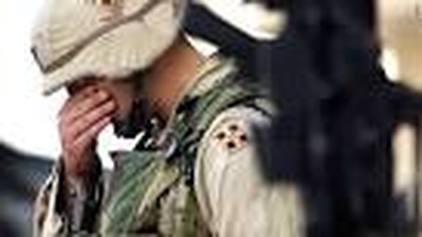~ Military/War Trauma ~

It is important to note right out of the proverbial gate, that while there is no such thing as a disorder called Military Trauma, it is used here and elsewhere to refer to a group of recognized psychiatric signs and symptoms that when taken together form a clinically accepted syndrome that are specific to persons who served in the Armed Forces.
The majority of persons when asked what comes to mind when hearing the term Military Trauma, it would be a fairly safe assumption to think Post-Traumatic Stress Disorder (PTSD). The positive takeaway from this is that it means there is now a majority of persons that are both aware of PTSD, and aware that PTSD poses a significant risk for member of the Armed Forces. It is not true however that PTSD is distinct to combat veterans. PTSD is a serious psychiatric disorder that applies to anyone having witnessed or experienced an extraordinary event causing them to fear for their life, and who has then developed a specific set of intrusive, life-altering symptoms that do not abate, For a better understanding of PTSD and the fascinating history on the origins of the disorder, you can go to or click on the tab PTSD/C-PTSD in this section.
Unfortunately, we have added to the diagnostic list of disorders that can be attributed solely to our men and women in the armed services, and these *are* specific to military personnel. They are called Military Sexual Assault (MST) and Combat and Operational Stress Reaction (COSR).
Military Trauma can refer to either Military Sexual Trauma (MST) or Combat and Operational Stress Reaction (COSR), an analog to a different psychiatric disorder found in the non-military population called Acute Stress Reaction (ASR), or it might refer to the psychological scaring wounds of war that are often horrific and deeply troublesome, but for myriad reasons, did not develop into the full symptom picture of a PTSD. Please click here to learn more about MST, or here for more about COSR.
You may also contact Dr Ullman for more information.
Please be mindful when using the information presented on this website when used to diagnose self or other by clicking HERE to read the important caveat.
The majority of persons when asked what comes to mind when hearing the term Military Trauma, it would be a fairly safe assumption to think Post-Traumatic Stress Disorder (PTSD). The positive takeaway from this is that it means there is now a majority of persons that are both aware of PTSD, and aware that PTSD poses a significant risk for member of the Armed Forces. It is not true however that PTSD is distinct to combat veterans. PTSD is a serious psychiatric disorder that applies to anyone having witnessed or experienced an extraordinary event causing them to fear for their life, and who has then developed a specific set of intrusive, life-altering symptoms that do not abate, For a better understanding of PTSD and the fascinating history on the origins of the disorder, you can go to or click on the tab PTSD/C-PTSD in this section.
Unfortunately, we have added to the diagnostic list of disorders that can be attributed solely to our men and women in the armed services, and these *are* specific to military personnel. They are called Military Sexual Assault (MST) and Combat and Operational Stress Reaction (COSR).
Military Trauma can refer to either Military Sexual Trauma (MST) or Combat and Operational Stress Reaction (COSR), an analog to a different psychiatric disorder found in the non-military population called Acute Stress Reaction (ASR), or it might refer to the psychological scaring wounds of war that are often horrific and deeply troublesome, but for myriad reasons, did not develop into the full symptom picture of a PTSD. Please click here to learn more about MST, or here for more about COSR.
You may also contact Dr Ullman for more information.
Please be mindful when using the information presented on this website when used to diagnose self or other by clicking HERE to read the important caveat.
